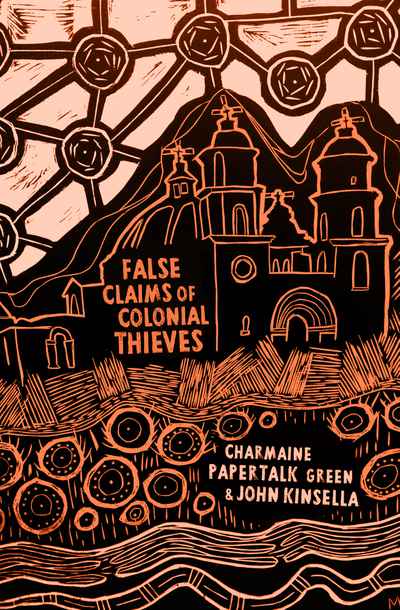It’s hard to believe that The Lucky Galah is a debut. It’s an ambitious, complex novel full of varying points of view, voices, historical narration, a variety of themes, and all sorts of subtle references, including many literary links and allusions, but the writing is so assured and smooth that these complexities become rich undercurrents that seamlessly integrate into the story rather than digressions.
A review of Incredible Floridas by Stephen Orr
 Times and places appear to so often remain in a form of flux throughout this novel, and to help me keep track I began underlining the locations with a yellow highlighter. As for those past decades chosen by Orr, I only have to close my eyes and it all comes back to me as if it were yesterday. Every neighbourhood seemed to have a problem son like Orr’s Hal: the one who started all the fires, or sometimes shot at you with his air rifle, and all too often kicked a neighbour’s garbage tin up and down the street.
Times and places appear to so often remain in a form of flux throughout this novel, and to help me keep track I began underlining the locations with a yellow highlighter. As for those past decades chosen by Orr, I only have to close my eyes and it all comes back to me as if it were yesterday. Every neighbourhood seemed to have a problem son like Orr’s Hal: the one who started all the fires, or sometimes shot at you with his air rifle, and all too often kicked a neighbour’s garbage tin up and down the street.
A review of False Claims of Colonial Thieves by Charmaine Papertalk Green and John Kinsella
 Though the poems stand alone and many have been published in literary journals that way, it’s the dialogue itself where the most important meaning happens. Both poets take on similar subjects of dispossession, occupation, the landscape and ecology, exploitation and historical revisionism. Both poets ultimately situate the work as a search for an identity born out of pain, guilt and suffering, and both respond through the others work to create connection and reconciliation.
Though the poems stand alone and many have been published in literary journals that way, it’s the dialogue itself where the most important meaning happens. Both poets take on similar subjects of dispossession, occupation, the landscape and ecology, exploitation and historical revisionism. Both poets ultimately situate the work as a search for an identity born out of pain, guilt and suffering, and both respond through the others work to create connection and reconciliation.
A review of Good Neighbors by Joanne Serling
 The seven adults in the circle are the most successful members of their families of origin and have more in common with each other than with their relatives. All remember their parents as “hopelessly authoritarian, yet clueless and also uninterested in parenting.” As it turns out, however, one family’s failure at parenting shakes the group to its foundations.
The seven adults in the circle are the most successful members of their families of origin and have more in common with each other than with their relatives. All remember their parents as “hopelessly authoritarian, yet clueless and also uninterested in parenting.” As it turns out, however, one family’s failure at parenting shakes the group to its foundations.
A review of All The Women In My Family Sing edited by ZZ Packer
 The stories, poems and essays of this book’s authors are courageous, refreshing and from the heart. We identify and are not strangers to their pain, love, joy, and their uncompromising outcries for justice. They address immigration, brokenness and the turbulent political and social climate we live under today. There are attempts by authors to fill wells of understanding.
The stories, poems and essays of this book’s authors are courageous, refreshing and from the heart. We identify and are not strangers to their pain, love, joy, and their uncompromising outcries for justice. They address immigration, brokenness and the turbulent political and social climate we live under today. There are attempts by authors to fill wells of understanding.
A review of She’s Not There by Joy Fielding
 This is a professional writer at her best and she is so good at her craft. Joy Fielding slips in many clever additions through her odds and evens chapters that skilfully gel everything together. She also maintains tautness within the dialogue that infects the reader’s curiosity and stays there all the way to an amazing and unexpected conclusion.
This is a professional writer at her best and she is so good at her craft. Joy Fielding slips in many clever additions through her odds and evens chapters that skilfully gel everything together. She also maintains tautness within the dialogue that infects the reader’s curiosity and stays there all the way to an amazing and unexpected conclusion.
A review of Minimalism by Joshua Fields Millburn and Ryan Nicodemus
 Millburn and Nicodemus used their own discontent as a springboard to identifying the things that were ‘anchoring’ them or holding them back from finding meaning in their lives. This included the big mortgage payments that came with the expensive houses, unhealthy relationships, car payments, debts, continual spending and the high pressure careers with long hours that were required to keep the cycle going.
Millburn and Nicodemus used their own discontent as a springboard to identifying the things that were ‘anchoring’ them or holding them back from finding meaning in their lives. This included the big mortgage payments that came with the expensive houses, unhealthy relationships, car payments, debts, continual spending and the high pressure careers with long hours that were required to keep the cycle going.
A review of Lucky Or Not Here I Come by Gerry Orz
 Lucky Or Not, Here I Come is the debut novel of Gerry Orz, written when he was just fifteen years old. Immediately the reader can see that Orz is a storyteller who keeps his audience engaged and involved. These attributes also translate well into his ventures in filmmaking.
Lucky Or Not, Here I Come is the debut novel of Gerry Orz, written when he was just fifteen years old. Immediately the reader can see that Orz is a storyteller who keeps his audience engaged and involved. These attributes also translate well into his ventures in filmmaking.
A review of Loose Ends by Caroline Taylor
 You can call Loose Ends social commentary, a mystery to be solved, a psychological thriller, an escape novel for the novel, and even a comedy of errors. While it’s a serious situation both women are in now and were in when they were growing up temporarily in El Salvador, there’s a comedic lining.
You can call Loose Ends social commentary, a mystery to be solved, a psychological thriller, an escape novel for the novel, and even a comedy of errors. While it’s a serious situation both women are in now and were in when they were growing up temporarily in El Salvador, there’s a comedic lining.
A review of The Measure of the Moon by Lisa Preston
 Preston crafts a parallel mystery that keeps the reader turning pages. What’s the link between these two characters? They appear to have nothing in common and are leading completely unrelated lifestyles. Gillian is an insulated city girl focused on her career and making a half-hearted attempt to save her crumbling marriage; Greer’s family is urban, outdoorsy, close-knit, and protective of each other.
Preston crafts a parallel mystery that keeps the reader turning pages. What’s the link between these two characters? They appear to have nothing in common and are leading completely unrelated lifestyles. Gillian is an insulated city girl focused on her career and making a half-hearted attempt to save her crumbling marriage; Greer’s family is urban, outdoorsy, close-knit, and protective of each other.